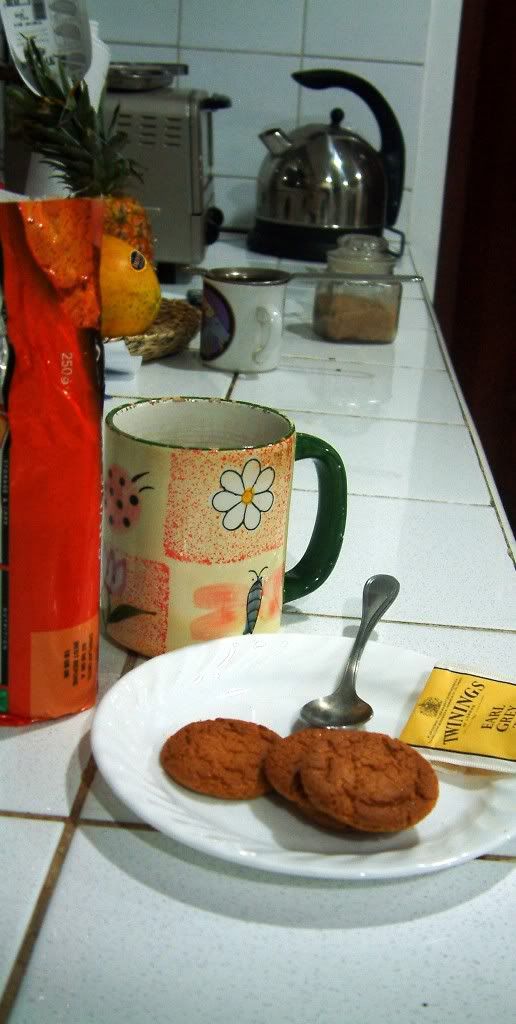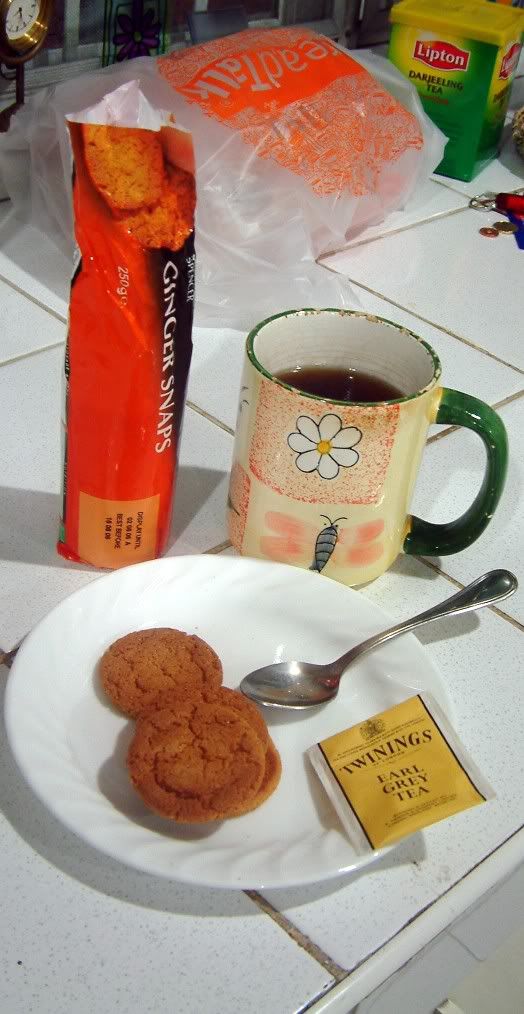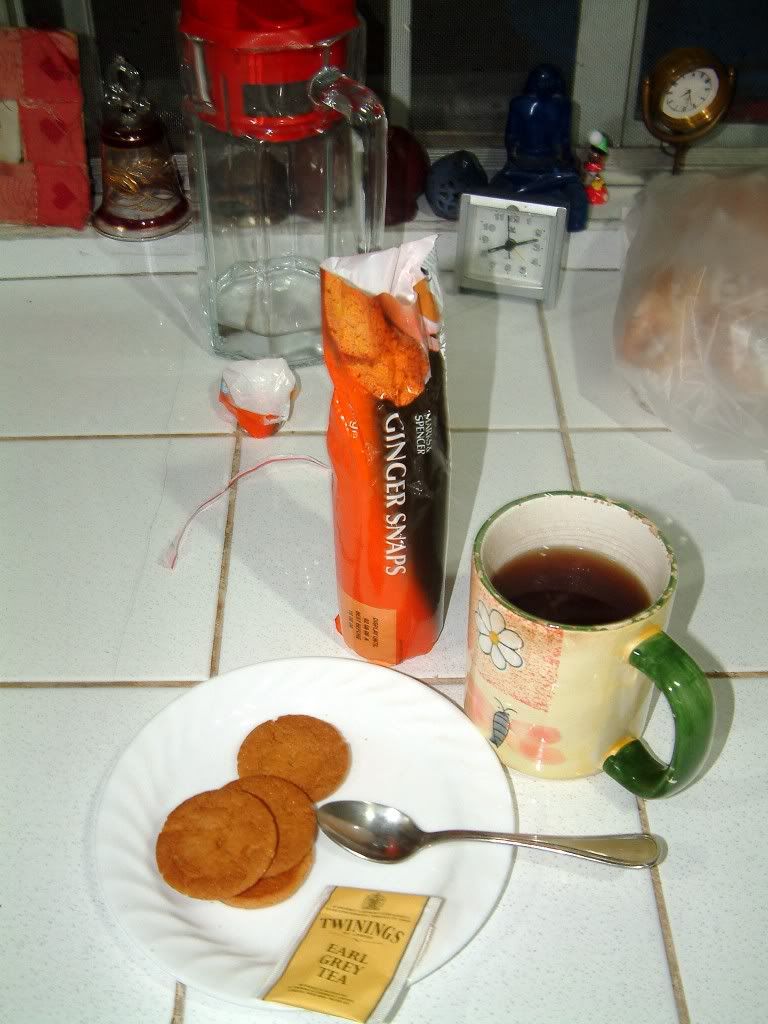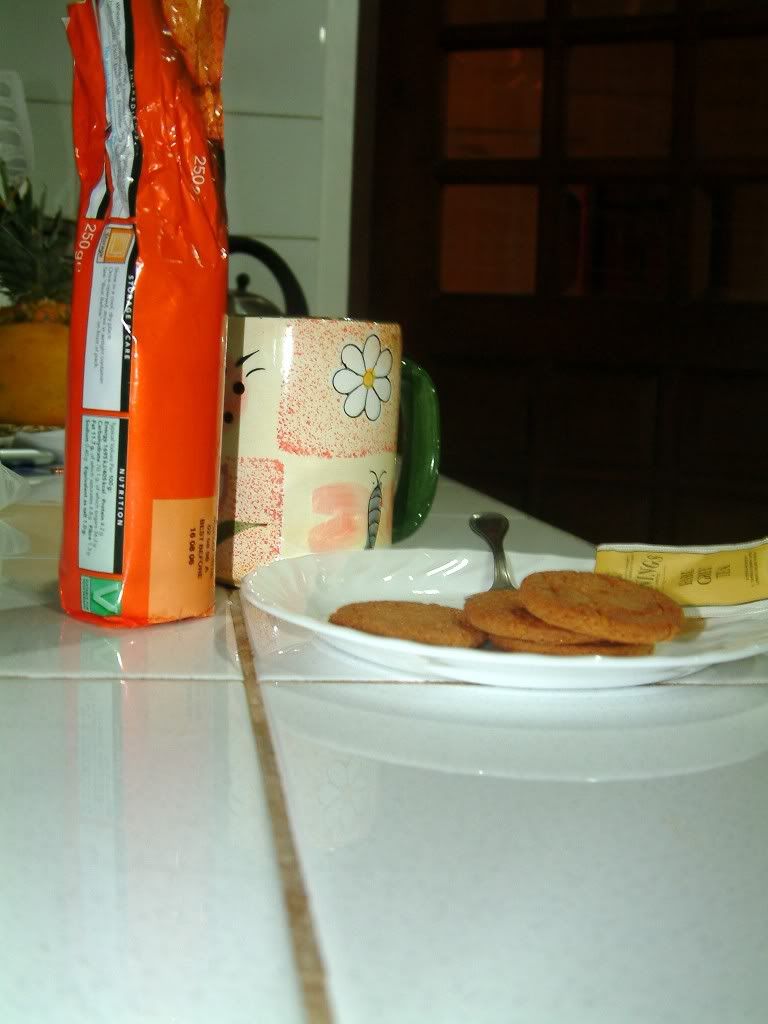What if Freud was wrong and each person had an unconscious desire to be English?
Right, because I am overdue for an entry, like a woman ten months pregnant. Eventually, I will post that entry that I'm writing about Doctor Who's Gay Agenda, because it totally has a very obvious one, but until then...
I went shopping yesterday (well, really two days ago) for Fahad, which was lots of fun. Seriously. He looks good in EVERYTHING. So now not only is my brother smart, and you know, cool, but he's also prettier than I am. He said some witty things, but I've forgotten them all.
Zara has the best clothes.
Now, a subject that is very dear to me. Tea.
My relationship with tea is a bit of an odd one. You wouldn't suspect it, but it's actually relatively unorthodox. Kind of like the man who tells his friends and colleagues how much he loves his wife every day, and then goes home and proves it to her by indulging in, oh I don't know, BDSM or watersports.
Which is perhaps an image you didn't need, but that's how I am with tea. You'll hear me talk about it rather often, especially if you travel with me or make the mistake of taking me to Starbucks. I like my tea, and I like it in a certain way.
So. I generally take my tea in a chipped coffee mug. It's always Earl Grey, prepared with a tea-bag and boiling water. If you don't understand the importance of this, go see what Neil Gaiman has to say, here and here. I put one teaspoon (not heaped!) of brown sugar and some almonds in it, put in the teabag, and then add the water.
And this would be the point where real tea-drinkers go "WTF?" Because Earl Grey is mean to be had with lemon (well, bergamot oil), and nobody puts almonds in their tea. But I like almonds, and the tea is hot enough that the skin comes off nicely. And tea-tinged almonds are nice.
Also, I drink my tea colder than most people. I usually wait until right after it stops steaming, so that, you know, my tongue doesn't burn off and I can actually taste my tea. Sometimes, while I'm waiting, I eat ginger snaps from Marks & Spencer.
"What is the point of all this?" you may be asking at this point. Well. Pictures!




Oh! Books! I just finished Einstein's Dreams by Alan Lightman. Tess got it for me, and wow, it is such an amazing, beautiful book. It basically chronicles a set of fictional dreams Einstein had while coming up with general relativity. It sounds like some popular science novel, but actually it's a series of heartbreaking vignettes about different worlds, where time funtions differently.
The world will end on 26 September 1907. Everyone knows it.
In Berne, it is just as in all cities and towns. One year before the end, schools close their doors. Why learn for the future, with so brief a future? Delighted to have lessons finished forever, children play hide-and-seek in the arcades of Kramgasse, run down Aarstrasse and skip stones on the river, squander their coins on peppermint and licorice. Their parents let them do what they wish.
...
One day before the end, the streets swirl in laughter. Neighbors who have never spoken greet each other as friends, strip off their clothing and bathe in the fountains. Others dive in the Aare. After swimming utnil exhausted, they lie in the thick grass along the river and read poetry. A barrister and a postal clerck who have never before met walk arm in arm through the Botanischer Garten, smile at the cyclamen sand asters, discuss art and color. What do their past stations matter? In a world of one day they are equal.
...
In the last seoconds, it is as if everyone has leaped off Topaz Peak, holding hands. The end approaches like approaching ground. Cool air rushes by, bodies are weightless. The silent horizon yawns for miles. And below, the vast blanket of snow hurtles nearer and nearer to envelop this circle of pinkness and life.
A world without memory is a world of the present. The past exists only in books, in documents. In order to know himself, each person carries his own Book of Life, which is filled with the history of his life. By reading its pages daily, he can relearn the identity of his parents, whether he was born high or born low, whether he did well or poorly in school, whether he has accomplished anything in his life. Without his Book of Life, a person is a snapshot, a two-dimensional image, a ghost. In the leafy cafes on the Brunngasshalde, one hears anguished shrieking from a man who just read he killed another man, sighs from a woman who just discovered she was courted by a prince, sudden boasting from a woman who has learned that she received top honors from her university ten years ago. Some pass the twilight hours at their tables reading from their Books of Life; others fill its extra pages with the day's events.
With time, each person's Book of Life thickens until it cannot be read in its entirety. Then comes a choice. Elderly men and women may read the early pages, to know themselves as youths; or they may read the end, to know themselves in later years.
Some have stopped reading altogether. They have abandoned the past. They have decided that it matters not if yesterday they were rich or poor, educated or ignorant, proud or humble, in love or empty-headed -- no more than it matters how a soft wind gets into their hair. Such people look you directly in the eye and grip your hand firmly. Such people walk with the limber sride of their youth. Such people have learned how to live in a world without memory.
Oh! And Alan Lightman teaches at MIT!
Also, you may have noticed that I've temporary adopted Forbes' (and the IB exam writers') tendency to bold key words and phrases. Everybody needs a change.
I went shopping yesterday (well, really two days ago) for Fahad, which was lots of fun. Seriously. He looks good in EVERYTHING. So now not only is my brother smart, and you know, cool, but he's also prettier than I am. He said some witty things, but I've forgotten them all.
Zara has the best clothes.
Now, a subject that is very dear to me. Tea.
My relationship with tea is a bit of an odd one. You wouldn't suspect it, but it's actually relatively unorthodox. Kind of like the man who tells his friends and colleagues how much he loves his wife every day, and then goes home and proves it to her by indulging in, oh I don't know, BDSM or watersports.
Which is perhaps an image you didn't need, but that's how I am with tea. You'll hear me talk about it rather often, especially if you travel with me or make the mistake of taking me to Starbucks. I like my tea, and I like it in a certain way.
So. I generally take my tea in a chipped coffee mug. It's always Earl Grey, prepared with a tea-bag and boiling water. If you don't understand the importance of this, go see what Neil Gaiman has to say, here and here. I put one teaspoon (not heaped!) of brown sugar and some almonds in it, put in the teabag, and then add the water.
And this would be the point where real tea-drinkers go "WTF?" Because Earl Grey is mean to be had with lemon (well, bergamot oil), and nobody puts almonds in their tea. But I like almonds, and the tea is hot enough that the skin comes off nicely. And tea-tinged almonds are nice.
Also, I drink my tea colder than most people. I usually wait until right after it stops steaming, so that, you know, my tongue doesn't burn off and I can actually taste my tea. Sometimes, while I'm waiting, I eat ginger snaps from Marks & Spencer.
"What is the point of all this?" you may be asking at this point. Well. Pictures!




Oh! Books! I just finished Einstein's Dreams by Alan Lightman. Tess got it for me, and wow, it is such an amazing, beautiful book. It basically chronicles a set of fictional dreams Einstein had while coming up with general relativity. It sounds like some popular science novel, but actually it's a series of heartbreaking vignettes about different worlds, where time funtions differently.
The world will end on 26 September 1907. Everyone knows it.
In Berne, it is just as in all cities and towns. One year before the end, schools close their doors. Why learn for the future, with so brief a future? Delighted to have lessons finished forever, children play hide-and-seek in the arcades of Kramgasse, run down Aarstrasse and skip stones on the river, squander their coins on peppermint and licorice. Their parents let them do what they wish.
...
One day before the end, the streets swirl in laughter. Neighbors who have never spoken greet each other as friends, strip off their clothing and bathe in the fountains. Others dive in the Aare. After swimming utnil exhausted, they lie in the thick grass along the river and read poetry. A barrister and a postal clerck who have never before met walk arm in arm through the Botanischer Garten, smile at the cyclamen sand asters, discuss art and color. What do their past stations matter? In a world of one day they are equal.
...
In the last seoconds, it is as if everyone has leaped off Topaz Peak, holding hands. The end approaches like approaching ground. Cool air rushes by, bodies are weightless. The silent horizon yawns for miles. And below, the vast blanket of snow hurtles nearer and nearer to envelop this circle of pinkness and life.
A world without memory is a world of the present. The past exists only in books, in documents. In order to know himself, each person carries his own Book of Life, which is filled with the history of his life. By reading its pages daily, he can relearn the identity of his parents, whether he was born high or born low, whether he did well or poorly in school, whether he has accomplished anything in his life. Without his Book of Life, a person is a snapshot, a two-dimensional image, a ghost. In the leafy cafes on the Brunngasshalde, one hears anguished shrieking from a man who just read he killed another man, sighs from a woman who just discovered she was courted by a prince, sudden boasting from a woman who has learned that she received top honors from her university ten years ago. Some pass the twilight hours at their tables reading from their Books of Life; others fill its extra pages with the day's events.
With time, each person's Book of Life thickens until it cannot be read in its entirety. Then comes a choice. Elderly men and women may read the early pages, to know themselves as youths; or they may read the end, to know themselves in later years.
Some have stopped reading altogether. They have abandoned the past. They have decided that it matters not if yesterday they were rich or poor, educated or ignorant, proud or humble, in love or empty-headed -- no more than it matters how a soft wind gets into their hair. Such people look you directly in the eye and grip your hand firmly. Such people walk with the limber sride of their youth. Such people have learned how to live in a world without memory.
Oh! And Alan Lightman teaches at MIT!
Also, you may have noticed that I've temporary adopted Forbes' (and the IB exam writers') tendency to bold key words and phrases. Everybody needs a change.